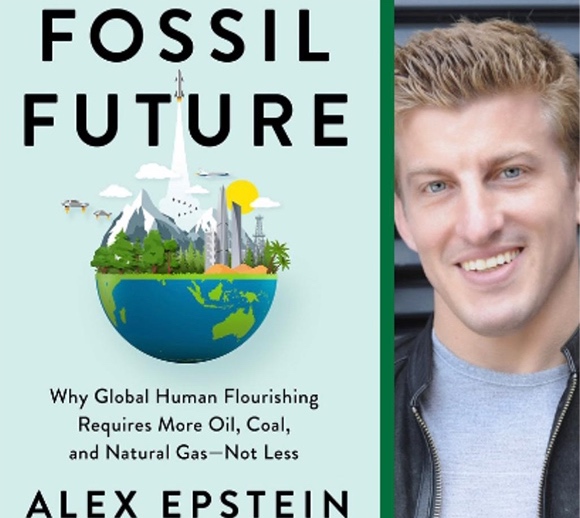
Energy expert Alex Epstein is convinced that when presented with the facts about fossil fuels’ positive impacts — not to mention their potential to improve the quality of life for billions of people in the developing world — even the “keep it in the ground” crowd will reconsider their stance.
That’s because he’s seen it happen.
Since 2014, when Epstein published “The Moral Case for Fossil Fuels,” he has seen non-supporters of fossil fuel usage become supporters. Maybe not enough, he acknowledges, but it happens.
In “The Moral Case for Fossil Fuels,” Epstein used logic and facts to show that fossil fuels’ ability to provide cheap, reliable energy to the world is a big, big deal — and that the world still needs that ability.
And now, with calls for a halt to fossil fuel production growing louder and more insistent, Epstein is once again countering emotional arguments with well-researched, logical truths. In his new book, “Fossil Future: Why Global Human Flourishing Requires More Oil, Coal, and Natural Gas — Not Less,” Epstein shows that the benefits of fossil fuels greatly outweigh their downsides, and they will for years to come.
“I am going to make the case that fossil fuel use will actually make the world a far better place, a place where billions more people will have the opportunity to flourish, including: to pull themselves out of poverty, to have a chance to pursue their dreams, and — this will likely seem craziest of all — to experience higher environmental quality and less danger from the climate,” Epstein writes in his book’s first chapter.
Epstein is not a climate change denier. He acknowledges that fossil fuels have contributed to the 1 degree C warming that has taken place over the last 100-plus years, and that they likely will contribute to more warming. But, he argues, the benefits of fossil fuel usage—beginning with the ability it gives us not only to survive but to thrive — greatly outweigh negative climate impacts.
What’s more, he writes, fossil fuels improve our ability to master climate danger. Fossil fuel usage has made the average person 50 times less likely to die from a climate-related disaster than they were in the 1 degree C cooler world of the past. Epstein points out that fossil fuel-powered machines are used to build weather-resistant buildings, to produce warmth, and to cool the air. Fossil-fueled irrigation systems help alleviate drought.
Fossil fuel usage is so important to the world’s future, Epstein writes, that “Today’s proposed policies to rapidly eliminate fossil fuel use would, if fully implemented, have truly apocalyptic consequences, making the world an impoverished, dangerous, and miserable place for most people.”
Not only do I strongly agree with the points that Epstein so eloquently makes about fossil fuels’ current and future importance, I agree with his optimism about the power of sharing the evidence of that importance clearly and persuasively. When fossil fuel critics are faced with truths, and they agree to at least consider them with an open mind, they can indeed become supporters, even advocates.
One of the reasons Alex Epstein is very popular in Africa, especially among young people, is because this generation of Africans are very sensitive about being subjected to more elitist and western propaganda on politically correct issues. Alex Epstein book has not told them what to think but how to think. They see the bullying from western countries and punishment through inadequate investments across the value chain in leading hydrocarbon-producing countries such as Nigeria, Algeria, Libya, Angola and Egypt.
After all the pledges at COP26, western countries have continued to invest heavily in fossil fuels because they know the their economies need them but they want to force Africans in Mozambique, Namibia, South Africa, Nigeria, Equatorial Guinea, Senegal, Mauritania, Ghana, Cameroon and many others to leave their resources in the ground.
Look at former UN climate envoy Mary Robinson, who is also a former president of Ireland. As recently as last November, during the UN Climate Change Conference (COP26) in Glasgow, Scotland, Robinson chastised world leaders for what she saw as a lack of urgency to address climate change. Since then, after taking a closer look at what many Africans and the African Energy Chamber has queried for a long time, sub-Saharan Africa’s widespread energy poverty — 600 million people in the region lack reliable electricity, and 900 million go without clean cooking fuel — Robinson has started making case for continued natural gas production and usage in Africa.
“Africa is trying to get its voice out about its needs for just, equitable energy, and of course that implies some use of gas as a just transition,” Robinson told The Guardian. “There has to be a certain leeway to tackle the energy poverty in Africa and give Africa a faster capability to move.”
Amen. Hearing Robinson’s level of understanding and respect for Africa’s energy needs is a huge step in the right direction.
The African Energy Chamber has spent years making a case for the vital role natural gas has to play in eradicating energy poverty, growing and diversifying economies, facilitating monetization, and providing Africans clean energy as the continent transitions to renewables like solar, wind, and hydrogen energy.
To say we’ve met resistance has been an understatement. Concerns about the climate have fueled strong emotions, and increasingly, Western countries and environmental groups have been pressuring African countries to make an immediate transition to renewables. Not only that, they’ve pressured investors to stop supporting African oil and gas projects. They’ve pressured international oil companies to stop exploration and production activities here.
That’s why the African Energy Chamber is encouraged to have a knowledgeable and outspoken advocate for fossil fuels adding his voice to the discussion about our world’s energy future. We’re encouraged to have an advocate who uses facts to show that fossil fuel usage, particularly for developing countries, will be necessary well into the future.
Epstein’s “Fossil Future” is just what the world needs.
Source: NJ Ayuk





